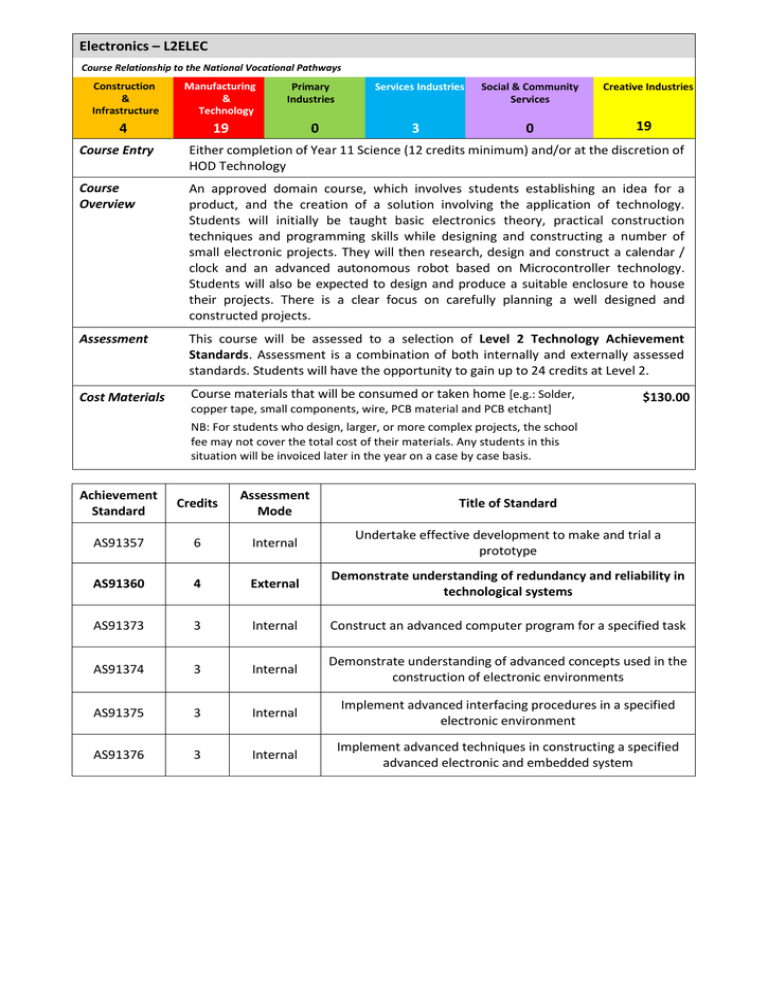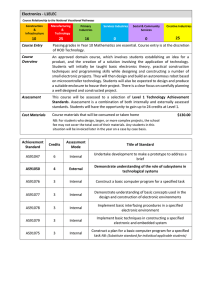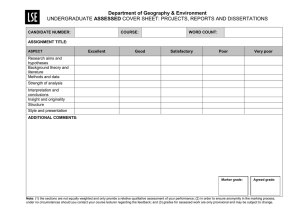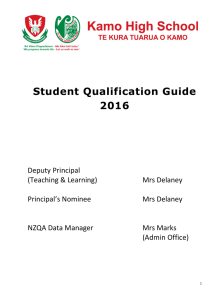Course Outline Hard Tech Electronics Level 2
advertisement

Electronics – L2ELEC Course Relationship to the National Vocational Pathways Construction & Infrastructure Manufacturing & Technology 4 19 Primary Industries 0 Services Industries 3 Social & Community Services 0 Creative Industries 19 Course Entry Either completion of Year 11 Science (12 credits minimum) and/or at the discretion of HOD Technology Course Overview An approved domain course, which involves students establishing an idea for a product, and the creation of a solution involving the application of technology. Students will initially be taught basic electronics theory, practical construction techniques and programming skills while designing and constructing a number of small electronic projects. They will then research, design and construct a calendar / clock and an advanced autonomous robot based on Microcontroller technology. Students will also be expected to design and produce a suitable enclosure to house their projects. There is a clear focus on carefully planning a well designed and constructed projects. Assessment This course will be assessed to a selection of Level 2 Technology Achievement Standards. Assessment is a combination of both internally and externally assessed standards. Students will have the opportunity to gain up to 24 credits at Level 2. Cost Materials Course materials that will be consumed or taken home [e.g.: Solder, copper tape, small components, wire, PCB material and PCB etchant] $130.00 NB: For students who design, larger, or more complex projects, the school fee may not cover the total cost of their materials. Any students in this situation will be invoiced later in the year on a case by case basis. Achievement Standard Credits Assessment Mode Title of Standard AS91357 6 Internal Undertake effective development to make and trial a prototype AS91360 4 External Demonstrate understanding of redundancy and reliability in technological systems AS91373 3 Internal Construct an advanced computer program for a specified task AS91374 3 Internal Demonstrate understanding of advanced concepts used in the construction of electronic environments AS91375 3 Internal Implement advanced interfacing procedures in a specified electronic environment AS91376 3 Internal Implement advanced techniques in constructing a specified advanced electronic and embedded system SENIOR ASSESSMENT PROCEDURES Legitimate Absences (e.g., official interschool exchanges, official work experience, and explained absences). The teacher may choose to: Allow for such circumstances by scheduling tests to days not affected by such approved absences. Give an equivalent test to the student(s) concerned on the student’(s)’ return to school following an approved absence (providing reasonable notice is given). Assessment Opportunity Students are expected to complete assessment activities on or before the date they are due. A further assessment opportunity will only be offered to classes where practicable. The final decision for this rests with the Head of Department. In some instances, the on-going collection of evidence by the teacher of the students’ knowledge or skills may provide sufficient evidence. Such evidence, for example, may be collected by the teacher in conferencing with individual students. Derived Grades These are only available for external standards and will depend on evidence available from practice examinations and other assessed work completed in class that is related to the same learning outcomes. Work Deadlines and Lateness Teachers will set a date by which all internally assessed qualification tasks must be completed and handed to the teacher. Late work will not be accepted. Any extension must be negotiated 48 hours before the due date for the completion of the work. You will require evidence to support your request for extra time. The classroom teacher will only grant an extension in the case of genuine illness or other exceptional circumstances. How to Appeal a Grade Appeals against internally assessed grades awarded should be made following the procedure outlined in the school policy on appeals. Students wishing to appeal a grade must do so within 48 hours of receiving notification of their assessed grade. Storage of Student Work The Technology Department will retain all student assessment material until it is no longer required by NZQA for moderation purposes. Authenticity Except where specified for some group tasks, all work is to be your own work and all assessment tasks will require a signed statement of authenticity from students. Marking and Moderation Students’ work will be marked by their subject teacher following NCEA assessment schedules. For marking consistency, some assessment tasks may be marked by the same teacher for all classes, or two or more teachers may be given a different section of the assessment to mark for all students. Moderation will take place at the beginning and end of each assessment as per Otumoetai College specification. Resources and Texts Generally, all text resources, and practical equipment will be supplied by the Technology/Hard Materials Department. If students wish to use additional texts, resources or equipment, this is permissible. Welcome to the Technology Department. We have a large range of courses for students to pursue and a dedicated team of supportive, expert teachers to guide you.



